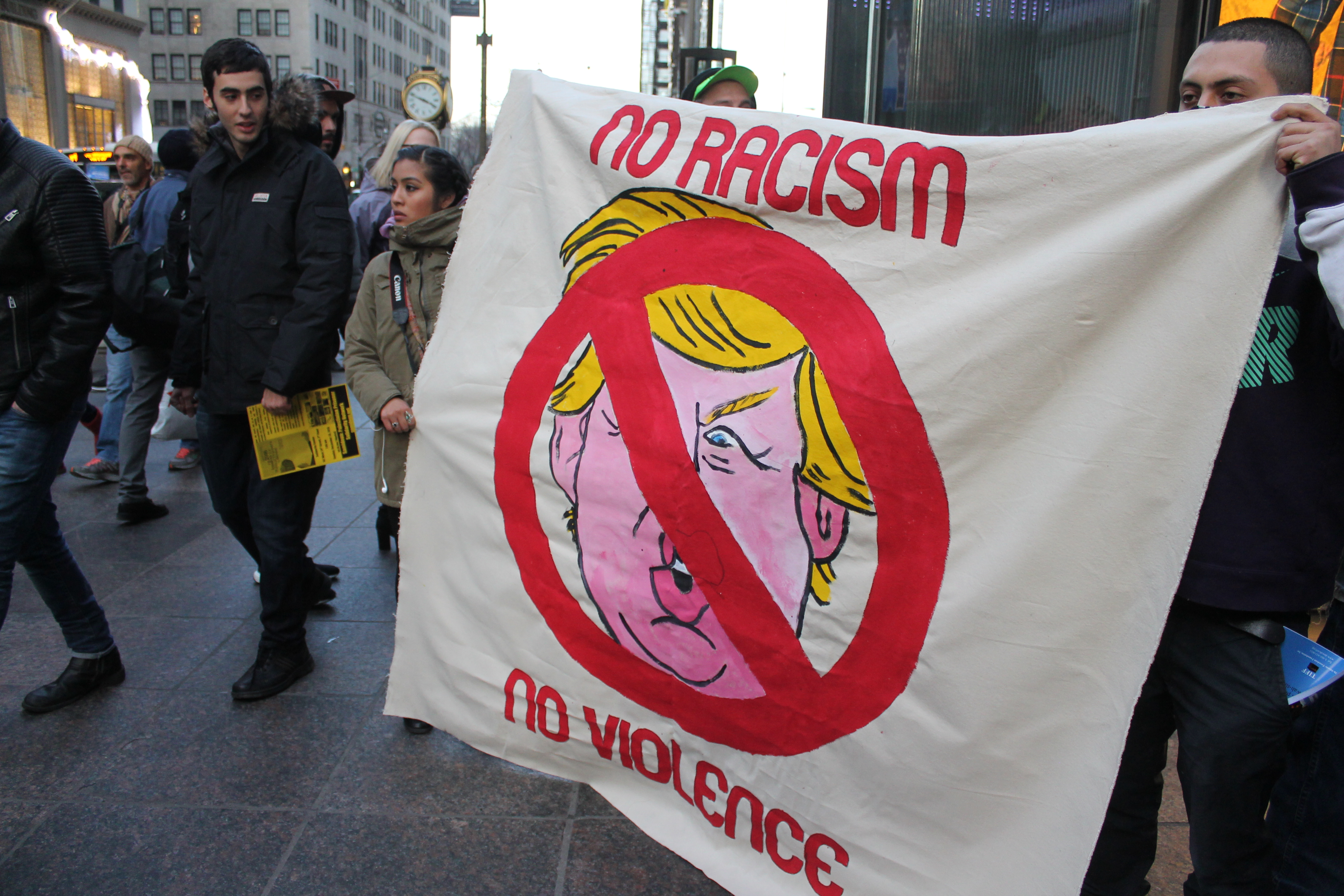Trump or the Decline of Historical Memory
Trump’s election creates new challenges for everyone involved in history teaching. What is it like to teach history when the nation’s president appears to chronically ignore factual evidence? What’s the task ahead?

December 20 – Hundreds protested outside Trump Tower before marching south to Herald Square. Photo by Joe Catron. CC BY-NC 2.0
“I don’t think there was any racism until Obama got elected,” Kathy Miller, Trump campaign manager in Mahoning County, Ohio, told a Guardian journalist in the run-up to the November elections. “If you are black, and you haven’t been successful in the last 50 years, it’s your own fault.” Spain, it turns out, is not the only country facing challenges when it comes to historical memory. Trump’s candidacy “represents the predictable outburst of an electorate whose civic awareness has been hollowed out,” the journalist Kevin Mahnken wrote. The country, he added, is facing “the bill come due for decades of failure in teaching American students the foundational concepts of their history and political system.” Trump’s election creates new challenges for everyone involved in history teaching—including ALBA.
The morning after last November’s election, ALBA’s teaching instructors, James Fernández and Peter Carroll, arrived at the planned professional development day for high school teachers in Bergen County, New Jersey. Weary from watching the late election returns, they entered school hallways crowded with students weeping openly, mourning the results and the consequences for their own lives. Inside classrooms, teachers expressed the same sentiment, with the additional burden of having to provide emotional support for their anxious students. We had all learned the great truth that separates hope and history.
“Trump embodies the failure of an educational system in which history teaching is less and less important,” says Kurt Russell, a Social Studies teacher at an Ohio high school. “But it’s not just that history takes up fewer hours or carries less weight. We used to agree that teaching history and civics helped form conscious citizens who knew how the system worked, understood this country’s evolution, and saw it in terms of values: truth and lies, justice and injustice. Who took for granted that the government served to protect the equal rights of its citizens. That’s no longer the case. And that’s partly due to standardized testing. According to the Ohio guidelines, for example, students are expected to know the Treaty of Versailles. But at no point do the standards talk about the values and ideals that informed it.” The Ohio legislature is Republican dominated. “You can tell,” says Tracy Blake, who teaches in a Cleveland suburb. “The Social Studies standards, for example, make no mention of human rights.”
“Trump embodies the failure of an educational system in which history teaching is less and less important.”
What is it like to teach history when the nation’s president appears to chronically ignore factual evidence? “It’s a real professional dilemma,” says Blake. “I have always tried to maintain a certain political neutrality in my classes when it came, for example, to different presidential candidates. In this case, that’s been impossible.”
For all his lack of historical knowledge, Trump represents an all-American archetype, says Daniel Czitrom, a member of the ALBA board who teaches history at Mount Holyoke college and has co-authored high school textbooks: “He’s a George Babbitt, or a P.T. Barnum.” Czitrom doesn’t agree that Trump’s rise can be blamed on the educational system. “Education doesn’t only occur in schools. In reality, those of us who teach history have the entire culture working against us. I notice it in my students. Just being interested in history makes you a nerd.”
The United States needs to get its historical memory in order more than ever, says Bryan Stevenson, the civil rights lawyer from Montgomery, Alabama, who received the 2014 ALBA/Puffin Award. “We are utterly incapable of reflecting honestly on our history and the things that we do wrong,” he said on that occasion. “We confuse pride and support for America with the notion that we can never apologize, never acknowledge our defects. And we are suffering because of it.” Inspired by the examples of Peru, South Africa, and other countries, Stevenson has called for a truth and reconciliation process. “Trump is the latest manifestation in a long line of hate,” Stevenson said in an interview with CNN in December 2015. “And if we don’t denounce his racism, we are aligning ourselves with the forces that perpetuated slavery … and instituted segregation.”
Sebastiaan Faber and Peter N. Carroll are former chairs of ALBA’s Board of Governors. A longer version of this article appeared, in Spanish, in CTXT: Contexto y Acción.












